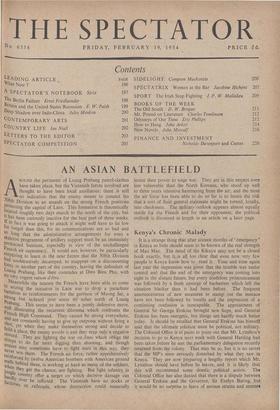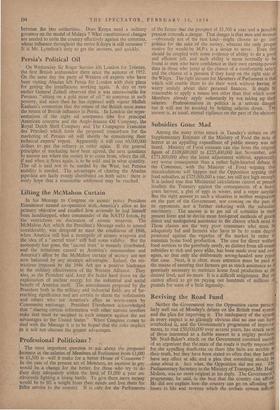Kenya's Chronic Malady
It is a strange thing that after sixteen months of emergency' in Kenya so little should seem to be 'known of the real streng of Mau Mau. The mind of the Kikuyu may not be a close book exactly, but it. is all too clear that even now very few people in Kenya know how to read it. Time and time again last year the impression was given that the trouble was under control and that the end of the emergency was coming into sight in the distant future, but every confident pronouncement was followed by a fresh upsurge of barbarism which left the situation blacker than it had been before. The frequent announcements of new measures to stamp out the menace have not been followed by results and the impression of a continuing confusion is inescapable. The appointment of General Sir George Erskine brought new hope, and General Erskine has been energetic, but things are hardly much better today. It should be recalled that General Erskine has himself said that the ultimate solution must be political, not military. The Colonial Office is at pains to point out that Mr. Lyttelton's decision to go to Kenya next week with General Harding had been taken before he met the parliamentary delegation recently returned from the colony. That may be so, but it is no secret that the MP's were seriously disturbed by what they saw in Kenya. They are now preparing a lengthy report which Mr. Lyttelton should have before he leaves, and it is likely that this will recommend some drastic political action. The Colonial Office has also denied that there is a dispute between General Erskine and the Governor, Sir Evelyn Baring, but it would be no surprise to learn of serious strains and stresses between the two authorities. Does Kenya need a military governor on the model of Malaya ? What constitutional changes are needed to unite the country effectively against the terrorists, whose influence throughout the entire Kikuyu is still immense ? It is Mr. Lyttelton's duty to get the answers, and quickly.



































 Previous page
Previous page